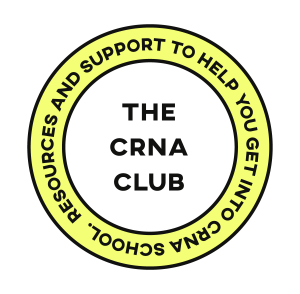The journey to becoming a Certified Registered Nurse Anesthetist (CRNA) is exciting and fulfilling, but the CRNA school application process is highly competitive. With many nurses vying for a limited number of spots, the key to success is early and strategic preparation. By starting at least one year before your target deadline, you’ll have ample time to meet CRNA school requirements and strengthen your application. Here’s how to plan effectively and ensure you’re ready to submit a standout application.
1. Review and Plan for CRNA School Prerequisite Courses
Most CRNA programs have specific prerequisite courses that you must complete before applying, such as organic chemistry or biochemistry. To avoid scrambling at the last minute, review your transcripts early and identify any courses you may need to retake, especially if you earned a B or lower.
Pro Tips:
- Focus on retaking key science courses like advanced pathophysiology or pharmacology to demonstrate your ability to handle graduate-level material.
- Plan ahead for course formats (online vs. in-person) and balance your workload accordingly.
- Be mindful that improving your GPA with these retaken courses takes time, so it's crucial to start planning at least a year in advance.
Taking these steps early ensures that your academic profile meets the standards set by CRNA programs.
2. Factor in Time for Standardized Testing
Some CRNA schools require standardized tests, such as the GRE (Graduate Record Examination), as part of the application process. If your target program has this requirement, don't underestimate the time needed to prepare.
GRE Prep Tips:
- Start with a baseline score by taking a diagnostic test, then create a study plan based on your strengths and weaknesses.
- Allow time for practice exams to track your progress and fine-tune your strategy.
- Aim for a competitive score, as a strong GRE result can make you a more attractive candidate to CRNA programs.
By factoring in time for thorough GRE preparation, you'll avoid the stress of cramming and improve your chances of achieving a top score.
3. Prioritize Certifications (Especially the CCRN)
Many CRNA programs highly value certifications like the CCRN (Critical Care Registered Nurse), which demonstrates your expertise in critical care. If you haven't yet earned this certification, start studying early to ensure you pass well before application deadlines.
Certification Tips:
- Block out time for CCRN exam preparation, including study sessions, practice questions, and review courses if needed.
- Consider pursuing additional certifications, such as the CMC, CSC, or TCRN, to further enhance your application and showcase your skills.
The more certifications you hold, the stronger your CRNA school application will be. Give yourself enough time to study and obtain these credentials.
4. Craft a Standout Personal Statement
Your personal statement is a critical part of your CRNA application. It’s your opportunity to convey your passion for anesthesia and highlight your qualifications. Starting early will allow you to write, revise, and perfect your essay.
Tips for a Strong Personal Statement:
- Start drafting your essay well in advance of the deadline, so you have plenty of time for revisions.
- Focus on why you want to become a CRNA, what drives you, and how your experiences have prepared you for this career.
- Proofread carefully and get feedback from colleagues or mentors to ensure your personal statement is polished and compelling.
A thoughtful, well-written personal statement can set you apart from other applicants.
5. Build a Professional and Polished Resume
A well-structured resume is crucial in making a strong first impression on the admissions committee. Start early to ensure it clearly presents your experience, skills, and achievements.
Resume Building Tips:
- Focus on organization and clarity: List your most relevant experiences first, and use bullet points to highlight key responsibilities and accomplishments.
- Be detail-oriented: Make sure your resume is free from errors and formatted professionally.
- Update regularly: As you gain new experience, certifications, or skills, keep your resume up to date.
A strong resume will demonstrate your attention to detail and professionalism—qualities that are essential for success as a CRNA.
Conclusion: Start Early for CRNA School Success
Applying to CRNA school is a competitive and complex process, but starting your preparation at least a year in advance will give you the time you need to meet CRNA program requirements and optimize your application. By planning ahead for prerequisite courses, certifications, standardized tests, and key documents like your personal statement and resume, you can build a compelling application that showcases your qualifications and passion for nurse anesthesia.
Ready to take the next step toward your CRNA career?
Download our free guide on "How to Become a Competitive CRNA School Applicant" and get insider tips to help you succeed in your application process. Apply to our 30-Minute Masterclass and start preparing for a bright future as a Certified Registered Nurse Anesthetist today!


